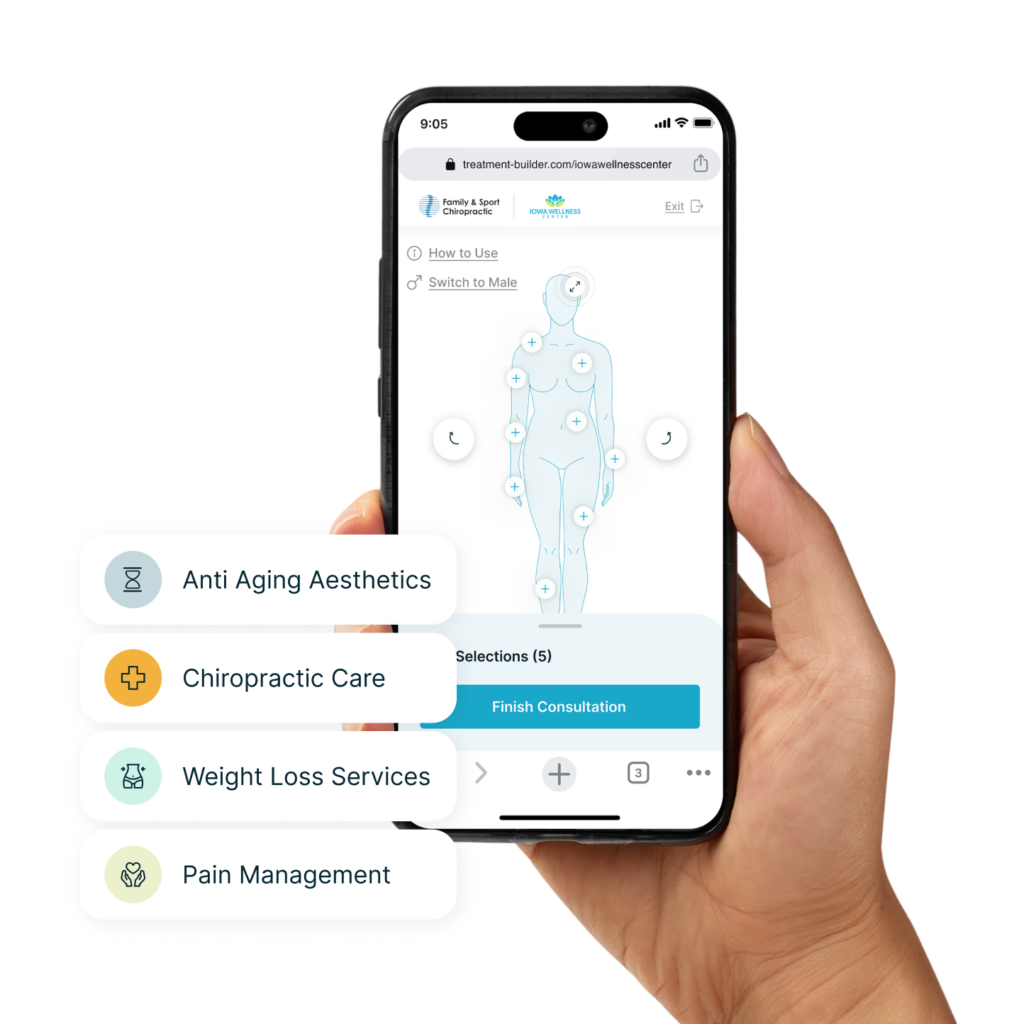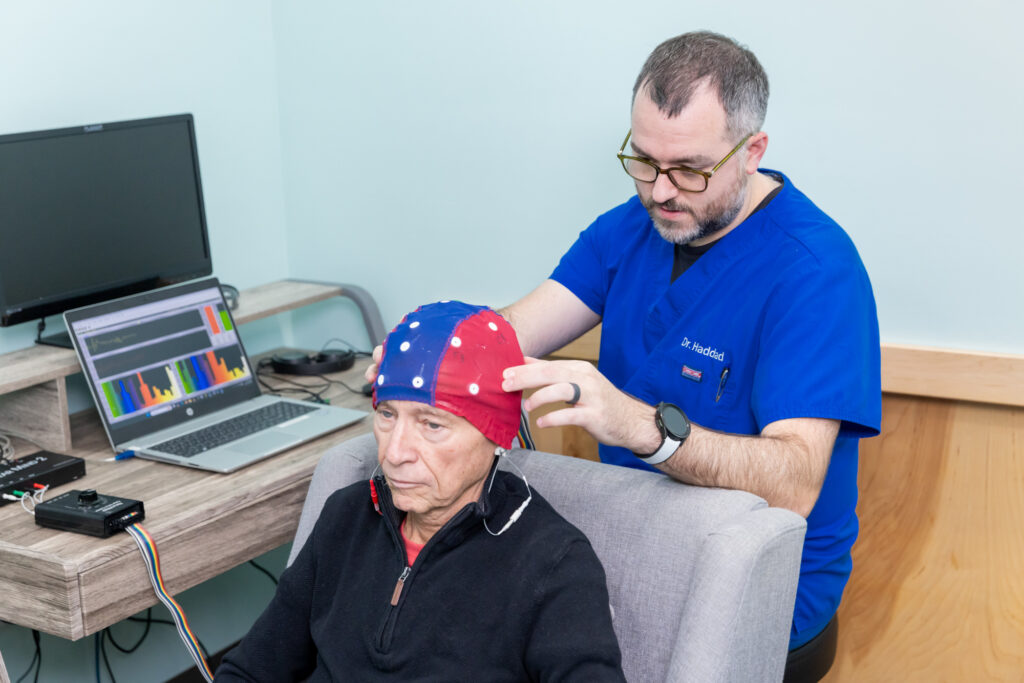
With modern imaging technology, we can better understand diseases and conditions that affect our neurological system and identify ways to treat them. This practice is called brain mapping.
Near Iowa City, you can come to Iowa Wellness Center, where we use this practice to help improve neuropathy symptoms, sleep patterns, and mental health conditions.
To learn more about what brain mapping is and how it can benefit you, keep reading.
First, Let’s Discuss the Brain
You’re probably already familiar with the brain and its numerous functions. After all, you know it’s responsible for your thoughts, emotions, memory, and motor skills. But how does it manage everything that forms your identity? To understand this, we need to explore the anatomy of our brains.
The Regions
The brain has 3 regions (the cerebrum, cerebellum, and brainstem), each responsible for regulating various functions, like thinking, balance and coordination, processing sensory information like sight, touch, smell, and temperature, and breathing—to name a few. Your brainstem connects to the spinal cord and relays sensory information and electrical impulses in a two-way relationship using the nervous system.
The Pathways
Each region’s components (think hemispheres and lobes) connect to the brain and body through neurons and neural pathways, the brain’s information highways.
The Brainwaves
When your neurons communicate, they produce electrical activity in the form of rhythmic patterns of different frequencies, also known as Hertz (Hz), and characteristics. These patterns are what we call brainwaves. When we perform brain mapping near Iowa City, we measure the 5 different types of brainwaves:
- Gamma – The fastest brain activity that’s necessary for processing information and memory. While important for learning, this wave can lead to anxiety or stress, and suppression can cause depression and learning disabilities.
- Alpha – These waves are produced when you’re relaxed. Leisurely activities like yoga, meditation, and even daydreaming activate these waves, improving mental health and cognitive function from the associated reduction in anxiety, stress, and insomnia.
- Beta – You rely on these brainwaves for problem solving, active thinking, and concentration. These are beneficial when finishing a task, but you need a balance of alpha and beta waves; otherwise, excessive beta activity can result in mental burnout, stress, and anxiety.
- Theta – You produce these waves during moments of relaxation and creativity. Take, for example, when you’re experiencing REM sleep and dreaming. This phase helps you process the events of the day.
- Delta – These brainwaves occur just before you reach REM sleep and are in a deep slumber. We rely on these for recovery and cellular regeneration (replacing old cells with new healthy ones).
Brain mapping near Iowa City helps us identify the specific region of the brain where these waves occur, and when it happens.
What Is Brain Mapping?
To put it simply, brain mapping (also known as neuromapping) is the study of the anatomy and function of the brain and spinal cord. You are probably familiar with MRIs or CT scans, which produce images of the structures of your brain to help us diagnose medical conditions like inflammation, abnormal growths, and tumors.
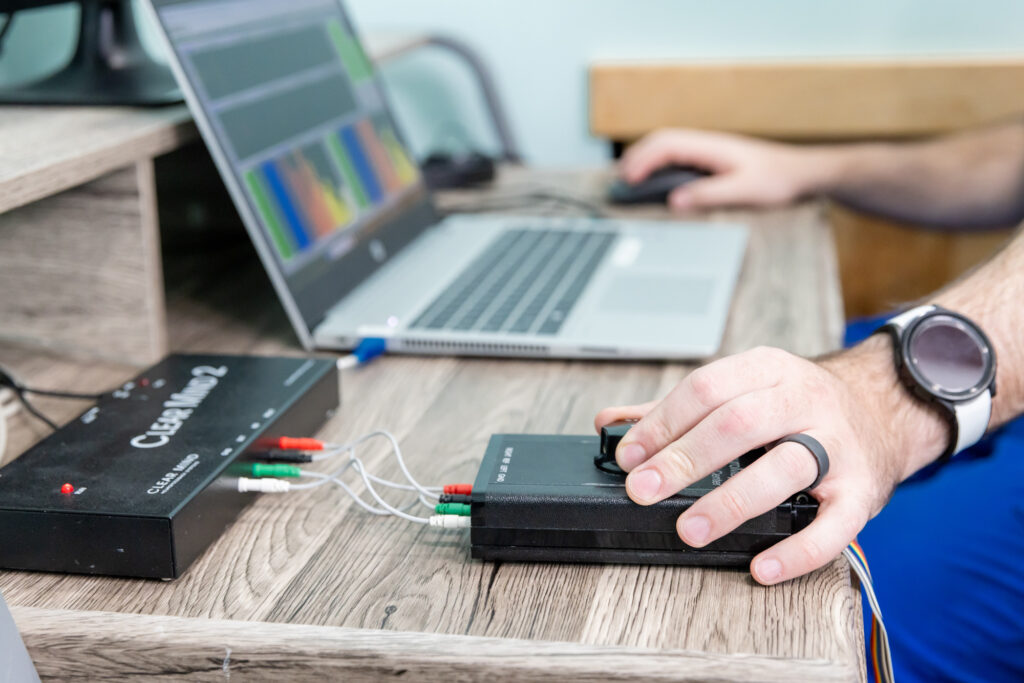
To measure your brainwaves, however, we rely on quantitative electroencephalography (QEEG). An EEG displays brainwave activity visually by measuring brainwave frequencies. This practice gives us a visual representation of activity within each region of the brain.
When we compare your results to “normal” brain activity, it helps us show which parts of the brain are over or under-active and which brainwaves are more consistent in those regions. This information guides us in creating personalized treatment plans to improve mental health, sleep-wake cycles, and even neuropathy symptoms.
Brain Mapping for Neuropathy
At Iowa Wellness Center, we consider ourselves neuropathy doctors, helping our patients find relief from the tingling, burning, and sharp sensations associated with this condition.
Neuropathy is caused by a malfunction in the communication pathway between your brain and spinal cord. It’s hard to determine exactly what causes neuropathy, because it can result from nutritional deficiencies, diabetes, past injuries, infections, and much more. However, we do know that these conditions and events can damage the peripheral nervous system, inhibiting your nerves from sending proper signals and disrupting how your body interprets sensory information like touch, temperature, and pain.
Brain mapping near Iowa City is the first step in developing a plan to help manage the symptoms of neuropathy. The information collected helps us pinpoint the sources of pain activity in your brain.
Brain Mapping for Sleep
If you notice from our description of each different brainwave, these waves play a major role in sleep. Many things can keep you up at night; caffeine, stress, and anxiety are just a few examples. In isolated incidents, this is usually fine. However, chronic poor sleep can negatively affect nearly all of your bodily processes. Sleep plays a major role in learning and memory; therefore, sleep dysregulation can take a toll on cognitive function.
Ideally, you’ll produce alpha brainwaves in the transition between wakefulness and sleep. Theta waves should replace alpha before delta waves help you enter a deep sleep. If that’s not the case, you may experience insomnia, sleep-wake disorders, and even narcolepsy.
Brain mapping near Iowa City measures the amount of alpha waves that occur during deep sleep, interrupting delta waves. It can also measure how our brainwaves change throughout the day, and contribute to daytime sleepiness and even an inability to pay attention.
Brain Mapping for Mental Health
Brain mapping is used to help resolve anxiety, depression, ADHD, substance abuse, and much more. While it seems like these conditions appear to be more cognitive, emotional, or behavioral, when you look at the brain and how it functions, you can classify these as neurological disorders.
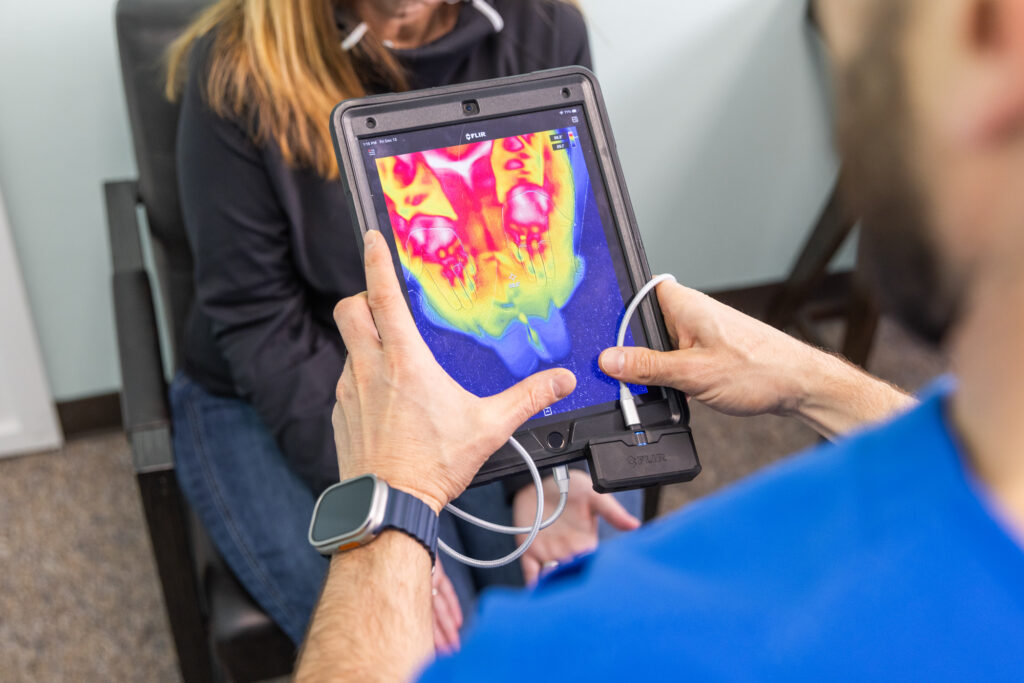
Brain mapping helps us determine where neural communication is malfunctioning, causing too much or too little of each brainwave in different areas of your brain.
What to Expect From Your Brain Mapping Session
We start with a comprehensive consultation where we discuss your symptoms: the severity, duration, and onset. This helps us determine if brain mapping is the right step in developing your treatment plan.
If we decide to move forward with brain mapping, we then place a cap with electrodes on your head. Wires connect the electrodes to a device that records brainwaves and shows them digitally. This process can take 20 to 40 minutes. During this time, you’ll relax with your eyes closed. In some instances, a member of our team will ask you to open and close your eyes, perform simple calculations, read a paragraph, or breathe differently.
Once we receive the results from your appointment for brain mapping near Iowa City, we develop your personalized treatment plan.
Neurofeedback Therapy
Brain mapping simply gives us the blueprint for your treatment, helping us understand which areas of the brain experience dysregulation. But let’s get one thing straight: brain mapping is not a treatment for neuropathy, mental health disorders, or chronic sleep conditions.
Instead, we rely on neurofeedback, a noninvasive therapy that re-aligns your brainwaves to better coincide with timing and activation patterns within your brain.
Using electrodes that are hooked to a computer screen (much like brain mapping), we track your brainwaves in real time and use auditory or visual signals to help you modify thought patterns. It’s like a rewards-based system that retrains your brain to regulate certain functions.
You’ll watch television while an EEG tracks and records brainwave patterns. Your brainwave activity will be directed by the computer through visual and auditory cues. When your brain’s activity is performing as it should, the screen will be bright, training you to continue this thinking pattern or process. On the other hand, when brain activity is not performing as it should, the screen darkens and trains you to respond differently.
Neurofeedback Therapy for Neuropathy
QEEG brain mapping near Iowa City pinpoints where the pain activity is present in your brain, and through neurofeedback, you learn to modify your own brain activity. This influences how you perceive pain, which neuropathy often alters. This isn’t our only neuropathy treatment. We also combine this therapy with nutritional guidance, ozone therapy, and a range of physical therapy and rehab treatments developed specifically to help alleviate neuropathy symptoms.
Neurofeedback Therapy for Sleep Improvement
By balancing brainwaves, neurofeedback increases alpha waves and decreases beta waves before sleep, and trains the brain to produce more theta and delta during sleep.
Neurofeedback for Mental Health
Whether you struggle with anxiety, depression, chronic stress, or even substance abuse, neurofeedback can help. It can improve alpha waves for those struggling with anxiety, helping you stay more relaxed. Patients struggling with depression typically produce more delta brainwaves. Neurofeedback trains your brain to produce more theta waves, improving your mood, cognitive function, and more.
Neurofeedback Sessions
We can’t determine how many sessions you will need until we see you, although we typically tell people it will be between 15 and 40 sessions. Retraining your brain takes time, commitment, and patience, but you’ll experience rewarding improvements throughout your treatment.
Some patients can also use our at-home neurofeedback treatment. This helps with neuropathy and sleep especially. We can talk about this option when you come in for your consultation.
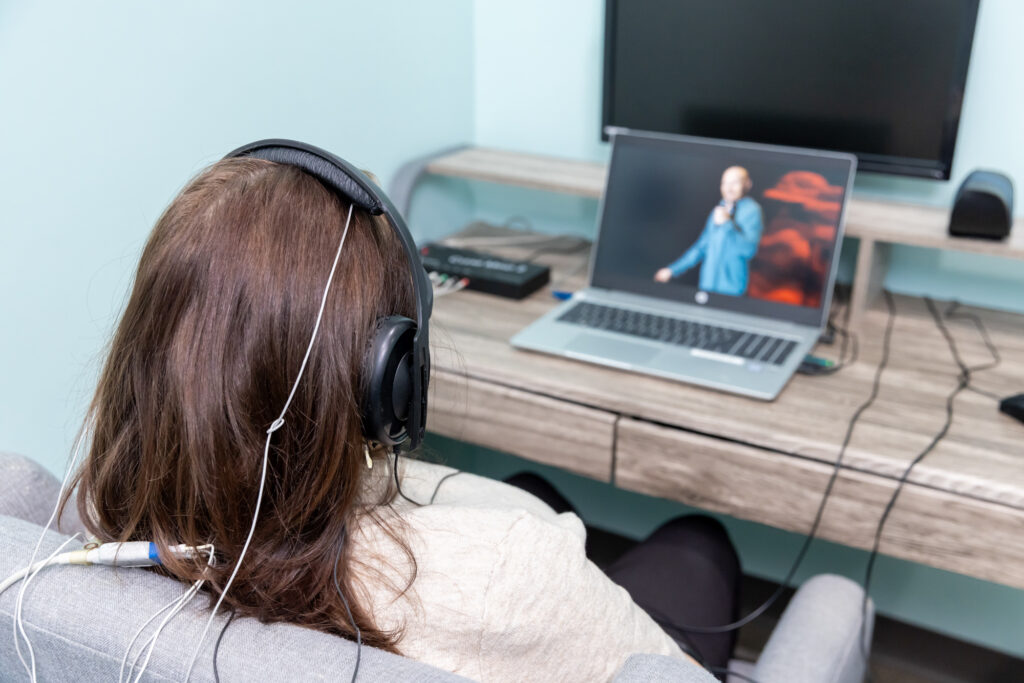
Retrain Your Mind
Brain mapping near Iowa City can help you understand yourself better—and help us understand how to help you. When you come to Iowa Wellness Center, we use this as a first step in a comprehensive treatment plan to help your overall health. To get started, try our treatment planning tool. Once we receive your submission, a member of our team will reach out with available appointment times.
Alternatively, you can request a consultation and start the process in person with our expert team.



